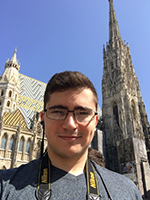
Student Profiles

1 Search Results

Mehdi Seif Hamouda
NIH Cambridge Scholar
B.S. Biomedical Engineering, North Carolina State University, 2016
Dr. Clare Waterman (NHLBI) and
Prof. Kevin Chalut (Cambridge)
Stem cell biology, Biophysics, Tissue engineering
Mehdi graduated Summa Cum Laude from North Carolina State University with a B.S. in Biomedical Engineering and a minor in Physics. His lifelong concern of the negative health effects that astronauts face during space flight burgeoned into a fascination of how forces affect cell development and function. As an undergraduate, Mehdi joined Dr. Elizabeth Loboa’s Cell Mechanics Laboratory at NCSU and investigated the mechanosensitivity of human adipose derived stem cells. Specifically, Mehdi worked on identifying the primary cilia to be a critical sensor that detects mechanical and electrical signals which direct adult stem cell differentiation. From this experience, Mehdi co-authored on two publications and won several undergraduate research awards.
After graduating from NCSU, Mehdi received the NIH Intramural Research Training Award and joined Dr. Daniel Douek’s Human Immunology lab at the Vaccine Research Center. Here, Mehdi contributed to developing a novel microfluidic based system with the goal of enabling the high throughput sorting of the latent reservoir of HIV.
After his year long experience at the VRC, Mehdi won the Whitaker International Fellowship which funded a year of research in Dr. Kevin Chalut’s Stem Cell Biophysics lab at the University of Cambridge, Stem Cell Institute. Here, Mehdi is investigating the role of forces in directing embryonic stem cell differentiation, specificity focusing on the mechanosensitivity of the nucleus.
Mehdi is driven to strengthen the understanding of how forces affect cell behavior, in hopes to gain insight of relevant disease states such as Emery-Dreifuss muscular dystrophy and progeria or health concerns such as the rapid tissue degeneration of astronauts in microgravity. Mehdi also hopes to gain better control of stem cell differentiation to ultimately develop novel tissue engineering and stem cell based therapy.


